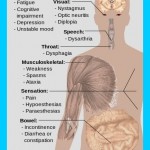Written by Titus Selvaraj
Definition
Multiple sclerosis (MS), also known as disseminated sclerosis or encephalomyelitis disseminata, is an inflammatory disease of the central nervous system in which the insulating covers of nerve cells in the brain and spinal cord are damaged. This damage disrupts the ability of parts of the nervous system to communicate, resulting in a wide range of signs and symptoms, including physical, mental, and sometimes psychiatric problems.
Incidence
Nine thousand people and their family members live with Multiple Sclerosis across Ireland and 2.5 million people worldwide suffer from MS.
It is most commonly diagnosed between the ages of 20-40, affecting women more than men in a ratio of 2.5:1.
Types of Multiple Sclerosis
- Primary-Progressive MS– About 10% of patients are diagnosed with primary-progressive MS.
- Relapsing-Remitting MS – the most common form of multiple sclerosis. About 85% of patients are first diagnosed with this type of MS.
- Secondary-Progressive MS – Some patients with Relapsing-Remitting MS go on to develop secondary-progressive.
- Progressive-Relapsing MS – a rare form of MS, occurring in less than 5% of patients.
Symptoms
- tingling and numbness in the face, hand and feet
- pain
- impairment of speech
- impaired balance and muscular coordination
- blurred vision
- severe fatigue
- spasticity
- Cognitive problems including thinking, concentration and memory
- bowel and bladder control problems
Physiotherapy Management
Some people with MS can develop complex patterns of disability affecting physical and social function.
Our chartered Physiotherapist provide a unique contribution to the management of people with MS to attain improvement and maintenance of functional abilities and management of the long term symptoms.
There is a strong evidence demonstrating that exercise used as part of a rehabilitation programme can increase activity and improve the health and well-being of people with MS.
Our physiotherapist will perform a comprehensive assessment that include a thorough history collection and physical assessment. From that potential problems are identified and management is precisely planned according to your needs and will differ from person to person. This includes:
- Active intervention with hands on physiotherapy.
- Tailored exercise prescription (eg) Muscle stretching and strengthening exercises. This can often be carried out at your home or clinic under our guidance.
- Monitoring your condition to identify the outcome and need for exercise modification as required.
- Guidance on management including fatigue management and pacing of activities.
- Communication with multi-disciplinary team will be made with occupational therapist, speech therapist, orthotist, podiatrist, doctors, nurse specialists, family and carers for continuity of care.
- Ordering and provision of orthotic needs.
- Referral to the appropriate professional as required.
- Training to family and carers concerning exercises.
- Instruction on aerobic exercise and improving cardiovascular fitness.
Benefits of Physiotherapy
- Improved mobility
- Improved independence with ADLs
- Improved emotional behavior
- Improved social interaction
- Recreational enjoyment
- Improved home management independence



